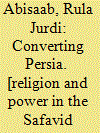|
|
|
Sort Order |
|
|
|
Items / Page
|
|
|
|
|
|
|
| Srl | Item |
| 1 |
ID:
067563


|
|
|
|
|
| Publication |
London, I B Tauris, 2004.
|
| Description |
xii, 243p.
|
| Standard Number |
186064970x
|
|
|
|
|
|
|
|
|
|
|
|
Copies: C:1/I:0,R:0,Q:0
Circulation
| Accession# | Call# | Current Location | Status | Policy | Location |
| 050586 | 297.820955/ABI 050586 | Main | On Shelf | General | |
|
|
|
|
| 2 |
ID:
144724


|
|
|
|
|
| Summary/Abstract |
Rebellions bringing together peasant-pastoralists, local dignitaries, and a few Sayyids prevented the Safavid monarchs from effectively controlling the political and economic activities in the province of Astarabad until the late sixteenth century. This paper investigates the nature of these rebellions led by the siyāh pūshān (wearers of black), and the socio-economic background and religious leanings of these rebels and their diverse allies. It also pays special attention to Astarabad's Sayyids, their intellectual formation, and their distinct approaches to the Safavid state from the early sixteenth century until the late 1570s when the uprisings lost much of their vigor. While heterodoxy may have been part of Astarabad's religious landscape, there is no evidence that it had a significant manifestation in the Siyah Push movement. More importantly, urban Shiʿi doctrinal and legal traditions had profound roots in Astarabad, nurtured by the Sayyids and promoted by the Betekchi dignitaries prior to the rise of the Safavids. This is significant given the fact that a group of Sayyids from Astarabad (especially the town of Fenderesk) were directly involved in the insurgency against the early Safavids.
|
|
|
|
|
|
|
|
|
|
|
|
|
|
|
|
| 3 |
ID:
139896


|
|
|
|
|
| Summary/Abstract |
In the early 17th century, the Shiʿi juristic tradition experienced the first coherent refutation of uṣūliyya, the ijtihādī rationalism used by the mujtahids, at the hands of Mulla Muhammad Amin Astarabadi (d. 1626–27). The latter rejected the efforts of leading Iraqi and Syrian jurists to apply ijtihād (rational legal inference), hadith categorization, and dirāya (scrutiny and stratification of accounts) in deriving Shiʿi law. The main studies on Astarabadi's akhbārī (traditionist) movement treat it as a reaction to the “influence” of Sunnism on the mujtahids or to their excessive “borrowings” from it, and stress the traditionists’ abhorrence of assimilating any aspect of Sunnism. Underlining the shortcomings of these explanations, this article presents Astarabadi's thought as a discursive development within the Shiʿi juristic tradition, which is part of the grand Islamic tradition. Astarabadi became skeptical of the mujtahids’ epistemology and methodology and was concerned that they jeopardized God's law and hence the believer's salvation. He protested the Safavid monarchs’ legitimation of uṣūlī legal authority, the latter's hierarchical features, and, ultimately, the sociopolitical domination of the ʿAmili mujtahids from Jabal ʿAmil in Syria (or modern-day South Lebanon), starting with al-Muhaqqiq al-Karaki (d. 1534).
|
|
|
|
|
|
|
|
|
|
|
|
|
|
|
|
|
|
|
|
|